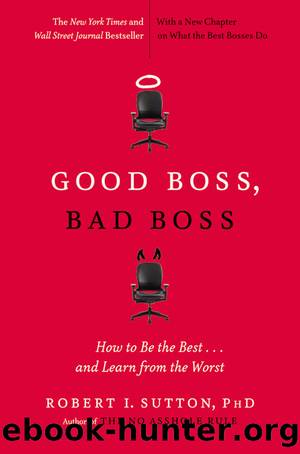Good Boss, Bad Boss by Robert I. Sutton

Author:Robert I. Sutton [SUTTON,, ROBERT I.]
Language: eng
Format: epub
Tags: BUS041000
ISBN: 9780446558471
Publisher: Grand Central Publishing
Published: 2012-03-14T16:00:00+00:00
The Art of Creative Incompetence
Your parents probably taught you that âanything worth doing is worth doing well.â Mine sure did. Alas, with all due respect, there are times when smart bosses do a lousy or half-assed job on purpose. They also sometimes encourage their people to join them in doing a crummy job. And such intentional ineptitude is sometimes the best option for enhancing performance and collective humanity. Creative incompetence was popularized by The Peter Principle in the 1960s, the wise parody I mentioned earlier. Dr. Peter argued that creative incompetence was the best way to avoid being promoted to oneâs level of incompetence. He proposed that by choosing to appear incompetent at things that are irrelevant to doing your current job well, your superiors will leap to the false conclusion that âyou have already reached your level of incompetence.â Dr. Peter suggested acts of creative incompetence such as losing irrelevant paperwork now and then, âaccidentlyâ parking in the company presidentâs parking space on occasion, dressing slightly shabbily; for women, he advised, âOverly strong perfume or overly brilliant jewelry work well in some cases.â
Creative incompetence can be dangerous, as it can be a form of sabotage and can harm people when used in the wrong ways. None of us wants our surgeon or airplane pilot to screw up on purpose when our lives are in their hands. And creative incompetence is unethical when used to lie, steal, or cheat, as was done by the accountants who worked for convicted Ponzi schemer Bernie Madoff. The New York Times reported that in pleading guilty, accountant David Friehling essentially âadmitted that he had never adequately audited the Madoff operation and, as an investor in the scheme, had never been a truly independent auditor. Nevertheless, he produced the supposedly professional and independent audits that sustained the Madoff fraud year in and year out.â
Although it is destructive in the wrong hands, creative incompetence can be effective and ethical when used in small doses and with proper precautions. Most bosses are expected to do so many things that it is often impossible to perform each chore perfectlyâor even very well. Good bosses focus their attention, and their peopleâs efforts, on the small number of things that matter most. The best bosses learn when they can and should ignore the least important demands from others. But some demands canât be avoided even though they have little, if any, impact on people or performance. In such cases, it might be wise to do a quick and crummy job so you can âcheck the boxâ and quickly move on to more crucial chores.
I learned this lesson while Jeff Pfeffer and I were doing research for The Knowing-Doing Gap, when we traveled to New York to talk with Citibank (now Citigroup) managers and executives. We had a memorable interview with a fellow whom executives had selected as one of the top performing branch managers in New York City. He told us that a key to his success was ignoring as many of the unnecessary demands that senior executives imposed on his branch as possible.
Download
This site does not store any files on its server. We only index and link to content provided by other sites. Please contact the content providers to delete copyright contents if any and email us, we'll remove relevant links or contents immediately.
The Ten Equations That Rule the World by David Sumpter(527)
A Leader Listens by Ajay Banga(526)
Decisions, Decisions How to Get Off the Fence and Choose What’s Best—for You! by RANDY W. GREEN(498)
The Art of Fairness by David Bodanis(496)
Dean Graziosi-Millionaire Success Habits-Dean Graziosi (2016) by Unknown Author(481)
Perfecting Your Pitch by Ronald M. Shapiro(404)
The F.I.R.E. Planner by Michael Quan(401)
Good Boss, Bad Boss by Robert I. Sutton(380)
The Power of 3 by Robb Hiller(372)
Big Boys' Rules by Mark Urban(371)
Master the Game of Money by Robbin Kelly(351)
The Three Signs of a Miserable Job by Patrick M. Lencioni(348)
Napoleon Hill's Golden Rules by Napoleon Hill(347)
Meetings With Remarkable Men by G.I. Gurdjieff(340)
Crush Your Career by Dee Ann Turner(338)
Napoleon Hill's Keys to Success by Napoleon Hill(333)
Direct Selling by unknow(325)
Train (Your Brain) Like an Olympian: Gold Medal Techniques to Unleash Your Potential at Work by Jean François Ménard & Marie Malchelosse(303)
The 4 Laws of Financial Prosperity: Get Control of Your Money Now! by Blaine Harris & Charles Coonradt(300)
